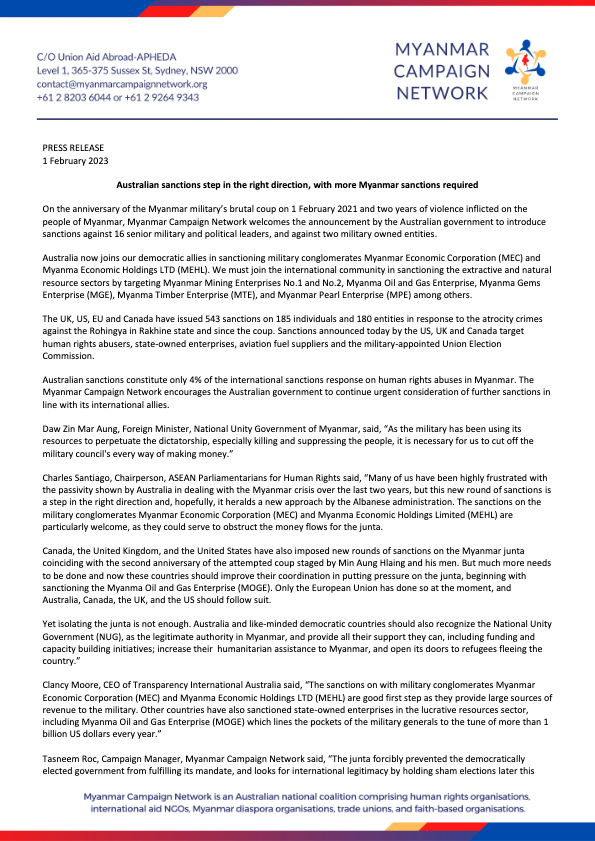Deconstructing The Double Standard: The True Aims Of UK And Australian Sanctions Against Myanmar

Table of Contents
The Official Narrative: Promoting Democracy and Human Rights in Myanmar
The publicly stated rationale behind UK and Australian sanctions against Myanmar centers on the condemnation of the February 2021 military coup, the subsequent human rights abuses, and the ongoing persecution of the Rohingya Muslim minority. Both governments have framed their actions as necessary steps to restore democracy and hold the perpetrators accountable.
- Specific human rights violations: The UK and Australia cite widespread reports of arbitrary arrests and detentions, torture, extrajudicial killings, and the systematic suppression of dissent. The brutal crackdown on pro-democracy protests and the targeting of ethnic minorities are consistently highlighted.
- Official statements and press releases: Numerous official statements from both the UK Foreign, Commonwealth & Development Office (FCDO) and the Australian Department of Foreign Affairs and Trade (DFAT) explicitly condemn the military regime's actions and justify the imposition of sanctions under international human rights law. These statements frequently reference the Universal Declaration of Human Rights and other relevant international treaties.
- International legal framework: The sanctions are often presented as being in line with international law, aiming to pressure the military junta to cease its human rights violations and return to a democratically elected government.
However, a closer examination reveals that this official narrative might only tell part of the story. The selective application of sanctions and the apparent lack of similar forceful responses in other comparable situations suggest the presence of additional, less publicly acknowledged, factors.
Geopolitical Interests and Economic Considerations
Beyond the stated commitment to human rights, the UK and Australian sanctions against Myanmar must be viewed within a broader geopolitical context. Significant economic interests and strategic considerations likely influence the severity and scope of these measures.
- Trade figures: Analysis of pre- and post-sanctions trade data between Myanmar and the UK/Australia reveals a decline in bilateral trade, suggesting an economic impact. However, the extent of this impact on the Myanmar junta's revenue streams requires further investigation.
- Multinational corporations: The influence of multinational corporations operating in Myanmar and their lobbying efforts on government policy cannot be ignored. These corporations' concerns about reputational damage and potential future market access may have played a role in shaping the sanctions regime.
- Regional power dynamics: Myanmar's strategic location and its proximity to China and other regional powers significantly influence the UK and Australia's approach. Competition with China for influence in the region may be a contributing factor driving these sanctions.
The Role of China and Regional Instability
China's significant economic and political ties with Myanmar's military junta are a crucial element in understanding the context of UK and Australian sanctions.
- Sino-Myanmar relations: China is Myanmar's largest trading partner and a major investor in various infrastructure projects. This close relationship provides a lifeline for the junta, mitigating the impact of Western sanctions.
- Regional instability: The imposition of sanctions could inadvertently exacerbate regional instability. Increased tensions and potential conflicts could have unforeseen consequences for the UK and Australia's regional interests.
- Competition and collaboration: The sanctions regime highlights a complex interplay of competition and potential collaboration between the UK/Australia and China regarding Myanmar. While the West seeks to isolate the junta, China's support provides a counterbalance.
Effectiveness and Impact of Sanctions: A Critical Assessment
The effectiveness of UK and Australian sanctions against Myanmar in achieving their stated goals remains debatable.
- Impact on the junta: While sanctions may have caused some economic hardship, evidence suggests that the Myanmar military regime has been able to adapt and mitigate the impact. The junta's access to alternative sources of funding and support from China limits the sanctions' effectiveness in significantly altering its behaviour.
- Unintended consequences: The sanctions have undoubtedly imposed hardships on the civilian population, exacerbating existing economic challenges and potentially undermining support for democratic movements. This unintended consequence raises ethical concerns about the overall strategy.
- Alternative strategies: A critical assessment necessitates the exploration of alternative strategies, including targeted sanctions against specific individuals within the junta, increased diplomatic pressure, and support for civil society organizations within Myanmar.
Double Standards and Inconsistencies in International Responses
A critical analysis of UK and Australian foreign policy reveals potential double standards in their approach to human rights violations.
- Comparative analysis: Comparing the response to Myanmar with responses to other instances of human rights violations or military coups around the world reveals inconsistencies. The intensity of the sanctions against Myanmar seems disproportionate compared to measures taken against other authoritarian regimes.
- Political alliances and biases: The influence of political alliances and geopolitical considerations on the selection of targets for sanctions cannot be dismissed. The UK and Australia's responses are arguably influenced by their strategic interests and relationships with other nations.
- Ethical implications: The apparent inconsistency in international responses to human rights crises raises significant ethical concerns. It undermines the credibility of international efforts to promote human rights and accountability.
Conclusion: Re-examining the UK and Australian Sanctions Against Myanmar
The complexity of the situation surrounding UK and Australian sanctions against Myanmar demands a nuanced understanding. While the stated goals of promoting democracy and human rights are laudable, the analysis presented here suggests that geopolitical interests and economic considerations play a significant, if often unacknowledged, role. The effectiveness of these sanctions in achieving their stated aims remains questionable, and the unintended consequences for the civilian population are cause for concern. We must demand greater transparency from governments regarding their sanctions policies and continue the conversation about the true aims of UK and Australian sanctions against Myanmar. Further research and critical discussion are vital to evaluating the ethical implications and long-term impact of this complex intervention.

Featured Posts
-
 Leonardo Di Caprio Hogyan Szabadult Meg A Herointol 30 Evvel Ezelott
May 13, 2025
Leonardo Di Caprio Hogyan Szabadult Meg A Herointol 30 Evvel Ezelott
May 13, 2025 -
 A Taste Of Friendship Exploring Indian And Myanmar Food
May 13, 2025
A Taste Of Friendship Exploring Indian And Myanmar Food
May 13, 2025 -
 A Marvel Es Scarlett Johansson A Kult Film Visszaterese
May 13, 2025
A Marvel Es Scarlett Johansson A Kult Film Visszaterese
May 13, 2025 -
 Ramadans End Will Hamas Free Edan Alexander And Other Captives
May 13, 2025
Ramadans End Will Hamas Free Edan Alexander And Other Captives
May 13, 2025 -
 Chinas Byd Challenges Fords Dominance In Brazils Ev Market
May 13, 2025
Chinas Byd Challenges Fords Dominance In Brazils Ev Market
May 13, 2025
